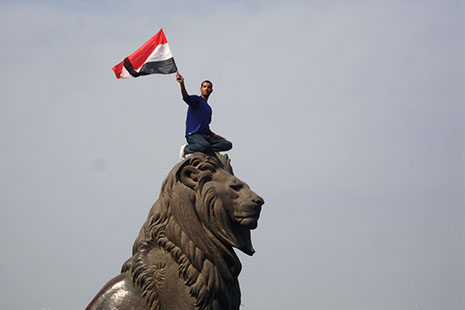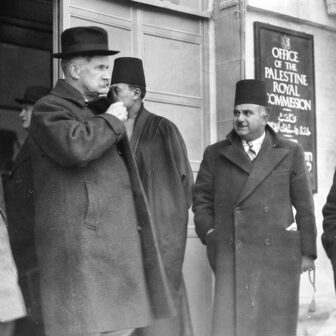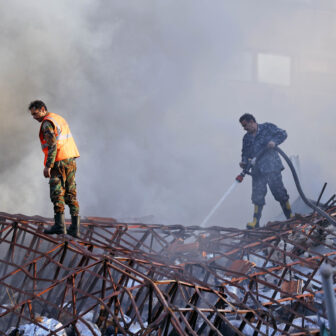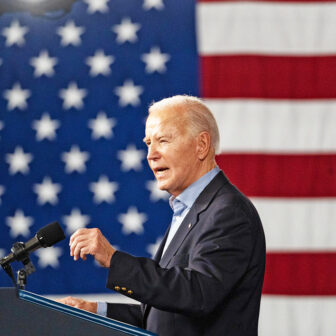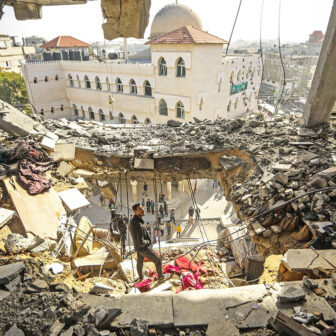EGYPTIANS are renowned for having a strong and cutting sense of humour – perhaps a comic approach to life is an essential tool for surviving in a country with so much promise but so many constraints – but one joke stands out. Varieties of it exist across the Arab world – it’s a good joke, after all – but one of the versions in Egypt is especially fitting for that country right now, and encapsulates why Egyptians are marching in the streets demanding their president’s political scalp:
The president feels under pressure, and decides to hire a new Minister for Transparency. He calls for interested people to come and see him. The first applicant, a career bureaucrat, comes along.
“OK,” says Mubarak, “I’ll test you with a question. What does two plus two equal?”
Being a bureaucrat, the applicant takes the cowardly course: “Well,” he says, “rather than me answer you now, let me set up an interdepartmental committee to look at all the possibilities, so as to make an informed choice and to report in five months as to―”
The president cuts him off: “Get out of my sight! There’s no way I am appointing you to the job, you fool!”
The second applicant comes in; a businessman, perhaps slightly tarnished by corruption, but a smart guy with an American MBA and a successful chain of business ventures to his credit. The president asks him the same question.
The second applicant looks at him, stunned, and answers: “Why, the answer is four, Mr President.”
The president harrumphs: “Get out of my sight! There’s no way I am appointing you to the job either!”
Finally a third applicant comes in. He is highly corrupt but well-connected, with a public service job but earning most of his vast income from shady private dealings that he finds through his work. Perhaps he is one of the “munfatihun,” the profiteers from economic reform in recent decades. The president offers him the same question.
“Just tell me,” says Mubarak, “What does two plus two equal? Answer that and you will be my new Minister for Transparency.”
“Ahh,” says the third applicant, smiling – he knows he has the job now – “two plus two equals three for you and one for me.”
The joke is more fitting than its inventor perhaps ever intended. It captures the cynicism towards a president who is doing something just because he needs to be seen to be doing something. It highlights the informality of politics. It puts the private sector into politics, where it has increasingly been since a series of market reforms began in the mid 1970s. And, above all, it states how central corruption has become: the Minister for Transparency will be anything but transparent.
A long period of frustration and a growing list of grievances led to the protests that have shut down Egypt and will remove the president, Hosni Mubarak, now or by September. Mubarak has been in power since the assassination of his predecessor, Anwar Sadat, in 1981, but some of the grievances even go back to Sadat’s predecessor, Gamal Abdel Nasser, who led the Free Officers Movement coup against the monarchy in 1952 and was president from 1954 to 1970. Recalled fondly by many – he was charismatic, strong-willed and relatively honest – Nasser nonetheless created the large, ineffective bureaucracy and created many other problems that today bedevil Egyptian development and politics.
At first Mubarak was to have been different. He was unlike Sadat, though both were military men. He was relatively unknown, he appeared shy, and he promised a period of stabilisation and a presidency of only two terms. He would not act like Sadat, who built palaces for himself and faced down violent protests in 1977 – the last before the current ones to threaten the survival of an incumbent president.
Almost twenty-nine years later, however, Mubarak is seen as no better than Sadat, and is held in even lower esteem. The economic and social strains on Egyptians are massive. Despite an impressive array of economic reforms, for example, which have gained Mubarak commendation from the United States and the IMF, ordinary Egyptians struggle financially. Wages are low: while an experienced engineer might command E£50,000 a year or more (around A$8500), most government employees or semi-skilled workers live (and often raise a family) on a third of that, and a great mass of unskilled Egyptians live on £20, or a little over $3, a day. At the same time, luxury apartments in gated communities can sell for what something similar would fetch on Sydney’s shoreline. Unemployment is officially about 9 per cent but real unemployment and underemployment probably exceed 25 per cent. Union powers were eroded by legal reforms in the 2000s. The government still talks of reform, yet persists with expensive subsidies, such as those on energy, that most benefit the wealthy.
Financial problems breed social ones, too. A great mass of graduates – often trained in fields the economy doesn’t need – either take a lower-status job or wait more than a decade for the government position that is still technically promised to them. After the time spent on military service and education, many Egyptian men have to wait until they are in their thirties before they can afford to marry. And a large number of Egyptians feel that their country is getting poorer and less fair, and that the homeless, the workers lurking in the black economy, and the touts harassing tourists at major sites are a blight on the proud history of one of the world’s great civilisations.
The protests are in large part about economics and the social issues that attend them, but ultimately people need to be sufficiently angry at political leaders to take to the streets. And Egyptians are furious, not without cause. They have long resented Mubarak, known as “the laughing cow” after the round packets of triangular-shaped soft cheese that in Egypt carry the label “Mubarak” (they’re available here in Australia as “Laughing Cow” cheese). Jokes on the street have, almost since he took power, centred on Mubarak’s supposed stupidity or his hesitation to commit to a policy or position. Other people simply speak of him angrily – if nearly always, until late January, in private. This behaviour both reflects and is encouraged by politics, which at senior levels is very cooptive and sometimes negotiated, but at the mass level is conducted through a variety of repressive processes: Mubarak has “taken the politics out of the politics,” as Samuel Himmel once said of dictatorship.
Perhaps most repressed is political Islam. The Muslim Brotherhood, formed in Egypt in 1928 and thus the Arab world’s oldest Islamic party, has been banned or repressed for much of its existence. Mubarak has retained the ban on the party’s involvement in politics, and allows it only the smallest of space in the social and cultural realms. By running independents, it in effect won eighty-eight seats in the last parliament – 20 per cent of the total – but that path to political influence as a party has been removed. It remains a matter of conjecture among observers as to how the Brotherhood would fare in a truly free poll: whether they would win a majority is debatable, but they would be a force to be reckoned with, and probably the single largest opposition force. The fact is that many Egyptians, Islamist or not, see the Brotherhood as clean and honest – and thus a far cry from Mubarak or his cronies.
For a secularist to challenge Mubarak has been risky too. Egypt may be a softer autocracy than some, but the regime can be nasty when necessary. An important opposition figure, Ayman Nour, discovered this when he ran for the presidency in 2005. He was never likely to win, even in a free contest, but the regime made sure of it. It took Nour three attempts to get his Al-Ghad party registered. Then, after campaigning for reform of the presidency, he was arrested on probably falsified charges. He was later released and allowed to contest the election, in which he came second to Mubarak, officially gaining 7 per cent of the vote but probably – independent monitoring of the poll was not permitted – closer to double that. In late 2005 he was found guilty of the charges and was given a six-year sentence, of which he served just over three. He is still around; he was injured protesting on 28 January.
Sometimes just a scent of threat has prompted Mubarak into acting. The secretary-general of the Arab League, Amr Moussa, was Egypt’s foreign minister from 1991 to 2001 but lost that position because of his popularity with Egyptians. The last straw for Mubarak was rumoured to have been the highly popular song by singer Shaaban Abdel Rahim which, reflecting the widespread sentiment of ordinary Egyptians, included the now-famous line, “I hate Israel and I love Amr Moussa.” At least he got the Arab League position; Ayman Nour got nothing, and reportedly was physically abused during his arrest. Amr Moussa could well be the next president: he has hinted that he will run for the position when polls are held, and is as popular as when Shaaban sang about him a decade ago.
Quite popular too, and astute, is Mohamed ElBaradei. Originally a lawyer and then a diplomat, he became famous as the head of the International Atomic Energy Agency from 1997 to 2009, a period that included 9/11, the 2003 Iraq war and years of investigations into Iran’s nuclear program. He has garnered support from several key groups involved in the current protests, probably including the Muslim Brotherhood (although their exact position on and links with ElBaradei remain uncertain), to lead an interim coalition if and when Mubarak leaves office. ElBaradei has been the most visible senior and figure in the protests, and would probably be favoured by much of the community. But he has lived outside Egypt for a long time, and even as an interim leader might struggle to build the base necessary to win an election convincingly under a new, permanent political system.
A final possibility is that power will again be transferred to a military officer or senior official. The new vice-president, Omar Suleiman, is technically the most likely candidate. Only appointed on 29 January – before that Mubarak had no nominated successor, most assuming that he was setting up his son Gamal to replace him – Suleiman previously was head of national intelligence, after a military career. He is loyal to Mubarak and not widely accepted on the streets – undermining his chances – but he reportedly is acceptable to many other countries, and has spent parts of his career fighting Islamic radicals, negotiating ly, and engaging in other duties that would train him well for the presidency. His fate will probably come down to whether the military would support him; they may prefer someone else still in uniform such as the Chief of Staff Lieutenant General Sami Annan, who would also find favour in Washington, and probably on the street – more so than Suleiman, certainly.
Mubarak is on borrowed time. The most he can do is cling to power until September, as he is trying to do. That might just work, if he can wear down the protesters and keep them as divided as possible. Regardless of when he goes, his main interest is in leaving the country with as much of his dignity and family money intact as possible. He probably does, also, truly want to leave the country stable, and have elections follow his departure, if mostly for the sake of his legacy. The outcome of any such elections is hard to predict; victory would rely on support bases yet to be built, and negotiations yet to take place. There are plenty of contenders, however, and despite what Mubarak would have had the world believe for the last twenty-nine years, many of those contenders are capable and, indeed, preferable to the “laughing cow.” •
